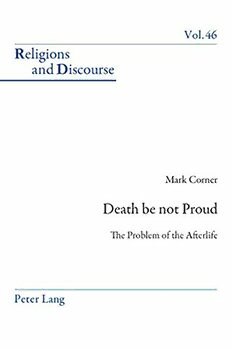
Death be not Proud: The Problem of the Afterlife PDF
Preview Death be not Proud: The Problem of the Afterlife
46 Vol. 46 Religions Religions and Discourse and Discourse M a Might people one day live for ever? Would they want to? What sense can be made r k of ideas commonly referred to in terms of an ‘afterlife’? What about notions of C o Heaven and Hell, of Purgatory and reincarnation? And in what sort of state are rn e human beings expected to be during this ‘afterlife’ – immortal souls or resurrected r bodies (and does either notion make sense)? What about the fact that any ‘afterlife’ l D concerns not just the fate of individuals but of society (‘communion of saints’) and ea t even the physical universe itself? h b e n o This book tries to survey some of the existing arguments about life ‘after’ death, with t P chapters on material from Christian tradition (particularly the New Testament and r o u the Early Church) and from the philosophy of religion. It then attempts to reach d its own conclusions, drawing on Kant and Barth in order to suggest that death is to Mark Corner be overcome rather than survived. Death be not Proud Mark Corner graduated from Cambridge University in 1975 in history and theol- The Problem of the Afterlife ogy and went on to complete his PhD on Karl Barth in Durham. Since then he has taught at the University of Newcastle upon Tyne, the Charles University in Prague and universities in Belgium (Louvain and Brussels). He has published books on both religion and international politics (most recently Signs of God: Miracles and their Interpretation, 2005, and The Binding of Nations: From European Union to Global Union, 2010). Peter Lang ISBN 978-3-03911-998-1 www.peterlang.com 46 Vol. 46 Religions Religions and Discourse and Discourse M a Might people one day live for ever? Would they want to? What sense can be made r k of ideas commonly referred to in terms of an ‘afterlife’? What about notions of C o Heaven and Hell, of Purgatory and reincarnation? And in what sort of state are rn e human beings expected to be during this ‘afterlife’ – immortal souls or resurrected r bodies (and does either notion make sense)? What about the fact that any ‘afterlife’ l D concerns not just the fate of individuals but of society (‘communion of saints’) and ea t even the physical universe itself? h b e n o This book tries to survey some of the existing arguments about life ‘after’ death, with t P chapters on material from Christian tradition (particularly the New Testament and r o u the Early Church) and from the philosophy of religion. It then attempts to reach d its own conclusions, drawing on Kant and Barth in order to suggest that death is to Mark Corner be overcome rather than survived. Death be not Proud Mark Corner graduated from Cambridge University in 1975 in history and theol- The Problem of the Afterlife ogy and went on to complete his PhD on Karl Barth in Durham. Since then he has taught at the University of Newcastle upon Tyne, the Charles University in Prague and universities in Belgium (Louvain and Brussels). He has published books on both religion and international politics (most recently Signs of God: Miracles and their Interpretation, 2005, and The Binding of Nations: From European Union to Global Union, 2010). Peter Lang ISBN 978-3-03911-998-1 www.peterlang.com Death be not Proud Religions and Discourse Edited by James M.M. Francis Volume 46 PEtER Lang Oxford • Bern • Berlin • Bruxelles • Frankfurt am Main • new York • Wien Mark Corner Death be not Proud The Problem of the afterlife PEtER Lang Oxford • Bern • Berlin • Bruxelles • Frankfurt am Main • new York • Wien Bibliographic information published by Die Deutsche nationalbibliothek. Die Deutsche nationalbibliothek lists this publication in the Deutsche national- bibliografie; detailed bibliographic data is available on the Internet at http://dnb.d-nb.de. a catalogue record for this book is available from the British Library. Library of Congress Cataloging-in-Publication Data: Corner, Mark. Death be not proud : the problem of the afterlife / Mark Corner. p. cm. Includes bibliographical references (p. ) and index. ISBn 978-3-0353-0024-6 1. Future life--Christianity. 2. Death--Religious aspects--Christianity. 3. aging--Religious aspects--Christianity. I. title. Bt903.C67 2010 236--dc22 2010037487 ISSn 1422-8998 ISBn 978-3-0353-0024-6 © Peter Lang ag, International academic Publishers, Bern 2011 Hochfeldstrasse 32, CH-3012 Bern, Switzerland [email protected], www.peterlang.com, www.peterlang.net all rights reserved. all parts of this publication are protected by copyright. any utilisation outside the strict limits of the copyright law, without the permission of the publisher, is forbidden and liable to prosecution. This applies in particular to reproductions, translations, microfilming, and storage and processing in electronic retrieval systems. Printed in germany Contents Preface ix Part One 1 Chapter One The Inevitability of Death 3 Chapter Two More of the Same? 17 Chapter Three The Moral Quality of Life 33 Part Two 47 Chapter Four Where There Is No Death I – Heaven 49 Chapter Five Where There Is No Death II – Hell 67 Chapter Six Eschatology 87 vi Part Three 107 Chapter Seven A Tale of Two Deaths 109 Chapter Eight The New Testament and the ‘Afterlife’ 125 Chapter Nine Paul and the ‘Afterlife’ 141 Chapter Ten The Post-Biblical Period 157 Part Four 177 Chapter Eleven Philosophical Investigations of the ‘Afterlife’ 179 Chapter Twelve The Idea of Reincarnation 191 Chapter Thirteen The Identity Problem 207 Part Five 221 Chapter Fourteen Having the Same Soul and Being the Same Person 223 vii Chapter Fifteen The Unavoidable Self 237 Chapter Sixteen Overcoming Death 249 Chapter Seventeen Summary and Conclusion 261 Bibliography 273 Index 279
